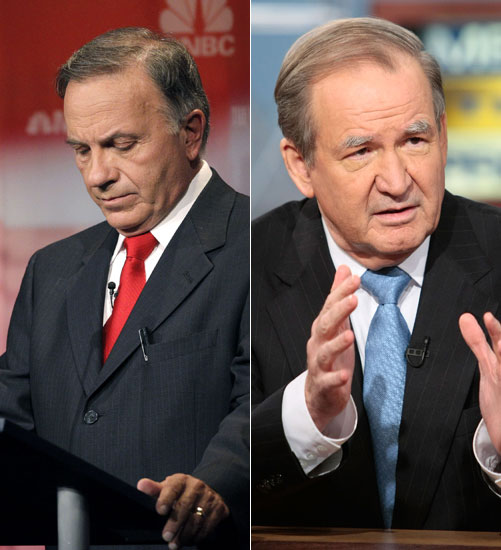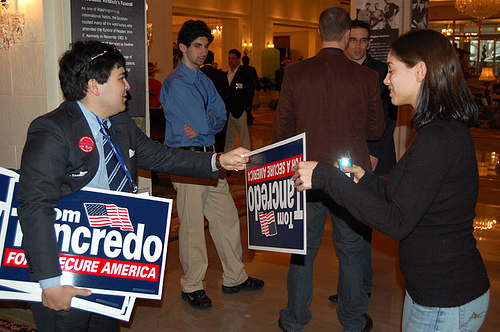Tancredo, Buchanan Bruised by Racist ‘Karate Chop’
Recent revelations that a Tancredo and Buchanan staffer pled guilty to assaulting an African-American woman makes their Sotomayor attacks a tough sell.
Author:Alex MercerReviewer:Nathanial BlackwoodJul 31, 2020306.8K Shares4.3M Views
Former Rep. Tom Tancredo (R-Colo.) and Pat Buchanan (Getty Images)
On July 7, 2007, Marcus Epstein had too much to drink and stumbled onto Georgetown’s scenic, shop-lined M Street, walking in no particular direction. At 7:15 p.m., he bumped into a black woman, called her a “nigger,” and struck her in the head with an open hand. An off-duty Secret Service agent was watching. Epstein “jogged away,” according tothe agent’s affidavit, and when Epstein was finally chased down, he “continued to flail his arms while being taken into custody.”
Image by: Matt Mahurin
After this, say Epstein’s friends, the then-24-year-old conservative activist radically changed his life. He swore off drinking and started attending meetings of Alcoholics Anonymous. He started treating the bipolar depression that had gone undiagnosed until that run-in with the law. In January 2008 Epstein plea bargainedto a charge of simple assault, as part of a settlement that included a letter of apology to his victim and a $1,000 donation to the United Negro College Fund. He will be in court again July 8, but because he met the terms of his settlement, Epstein’s employers expect the ordeal to end then and there. Epstein could not be reached for comment on Monday.
Epstein was, and still is, one of the utility players in the immigration restrictionist fringe of the conservative movement, the executive director of both Pat Buchanan’s American Cause and former Rep. Tom Tancredo’s (R-Colo.) Team America PAC. Before and after the 2007 incident, Epstein worked (in an unofficial capacity) with Tancredo on his immigration-focused presidential campaign. He organized policy debates between conservative writers and leaders, including one with Rep. Ron Paul (R-Texas) that was broadcast on C-SPAN. Epstein built coalitions and hobnobbed at Washington parties without much trouble, despite a record of controversial race- and immigration-focused writings and awareness that something bad — the details weren’t clear — had happened in 2007 that convinced him to go on the wagon.
“In collegeyou have this culture of drinking all the time, and he kicked it cold,” said Kevin DeAnna, a friend of Epstein and the founder of Youth for Western Civilization, a student group founded in 2008 of which Tancredo is the honorary chairman. “It’s unfortunate that he’s getting hit from this now, years after he stopped doing this kind of thing.”
Since May 19, when the watchdog group One People’s Project released the legal documentsdetailing Epstein’s arrest, the activist and his employers have come under fire. By late Monday, the University of Virginia Law School was telling reporters that Epstein would not be joining the class of 2012, even though he had planned to retire from his jobs at the end of June and“more or less suspend my political activities”to attend the school. But Epstein’s career up through yesterday was marked by controversial articles and speeches, happy feuds with politically correct organizations like the One People’s Project and the Southern Poverty Law Center, and no serious blowback from the mainstream conservative movement. (In 2008, Epstein contributed to the Southern Poverty Law Centerin order to win a place on its “Wall of Tolerance” and to warn the group that it was “just one degree of separation away” from him.) Epstein’s past only became an issue after his patrons, Tancredo and Buchanan, spent a week bashing Supreme Court nominee Sonia Sotomayor as a “racist” and an an “affirmative action”candidate.
“It’s a huge breakthrough,” said Darrell Jenkins, a co-founder of the nine-year-old One People’s Project. “This game that keeps being played on the right, the way that their leaders will say anything and claim that they’re not racist — that got knocked out the window. Now we have proof that someone of that stature is running around like an idiot in the streets. Why would a Tom Tancredo associate himself with a Marcus Epstein? If he’s going to go after Sotomayor for an out-of-context quote from 2001, he’s got to answer for this.” Jenkins added that he would “be in the courtroom” when Epstein is sentenced.
Marcus Epstein (left) at the Conservative Political Action Conference on March 1, 2007 (Photo by: Dave Weigel)
Epstein, who turned 26 in May, has spent his entire adult life courting controversy. In 2003, as the president of College Libertarians and the editor of the conservative newspaper at the College of William and Mary, he arguedthat conservatives erred by appropriating the rhetoric of Martin Luther King, Jr. instead of remembering his “philandering and plagiarism.” Before and after graduation Epstein carved out an online identity as an old-line, nativist conservative, contributingto the immigration restrictionist web site VDare.com. When he began working for American Cause, Epstein became a young and energetic proponent of ideas that were often attributed to angry, aging white men. “Pat graciously gave me an audio CD version of the book,” Epstein wrote in an article criticizing National Review for not reviewing Buchanan’s “State of Emergency,” an anti-immigration jeremiad. “The facts that he laid out in the book, made me so impassioned, upset, and often angry, that on more than one occasion, I literally had to pull over to a rest stop to compose myself for fear that I would get in a road rage incident.”
In 2006, Epstein co-founded a new paleoconservative group, the Robert Taft Club, with DeAnna; the leadership circle later expanded to include conservative writer Richard Spencer. The group easily drew in thinkers and activists from the mainstream and extreme right. Fox Newspundit Jim Pinkerton and National Review writer John Derbyshire appeared, as did Belgian extremist politician Filip Dewinter and Jared Taylor, editor of American Renaissance, a race-conscious conservative magazinewhich invited British extremist politician Nick Griffin to its 2006 conference. None of this was secretive — the events were on the record and included panelists who vehemently disagreed with one another. None of it backfired on the attendees, despite SPLC reports and other exposes. (Note: The writer of this story attended several Robert Taft Club events as a journalist.) The club’s best-attended events were organized after Epstein’s 2007 arrest, the details of which did not become known until this week. Now, some of the people Epstein had brought out for public debates worry about the effects of the One People’s Project’s revelations and the increased scrutiny that has come with Tancredo and Buchanan’s Sotomayor statements.
“It’s the sort of thing the left typically does,” Taylor told TWI. “The One People’s Project published my home phone number and home address, more or less inviting somebody to pitch a brick through my window. The Southern Poverty Law Center will be crowing and whooping about this. It’s typical of the other side and it’s an ungentlemanly way to conduct politics.”
On Monday, Bay Buchanan — the co-chairman of Team America PAC and the president of American Cause — defended Epstein and castigated the One People’s Project for dredging up the arrest details. Buchanan managed Tancredo’spresidential campaign, and Epstein did some volunteer speechwriting for the campaign before and after the arrest. Buchanan said he has worked through his problems, making it all the more mysterious that he should be targeted for them now.
“This is something that happened two years ago that Marcus has paid a price for,” said Buchanan. “Are people allowed a second chance in this life when they realize their mistakes and their errors? I think so.”
Tancredo and Pat Buchanan have not commented on the news of Epstein’s 2007 arrest, but DeAnna’s Youth for Western Civilization got out ahead of the storywith a May 29 statement that Epstein had no affiliation with the group apart from scheduling Tancredo’s speeches on college campuses. Pinkerton chose not to address the charges against Epstein, but he wondered what effect the rush by Tancredo and Buchanan to accuse Sotomayor of racism was having on the Supreme Court debate and on the conservative movement in particular.
“The ‘R’ word is a tough word,” said Pinkerton. “My immediate reaction to Sotomayor’s ‘wise Latina’ comment was ‘tell that to the people whose faces are on Mount Rushmore. They were pretty wise and they weren’t Latina females.’ That being the case, we all are blessed with the vocabularies to choose different words. In our culture, ‘racist’ is really up there in the Richter scale of words.”
Curt Levey, the executive director of the Committee of Justice, has been optimistic about the right’s fight against Sotomayor, but he admitted to TWI that he “underestimated the degree to which a few conservatives would say a few extreme things, and that would be characterized as what all conservatives think.”
For Epstein’s friends, this aspect of the Supreme Court debate has simply been surprising and sad. “I hope he can live it down,” said Taylor of American Renaissance. “I would have thought Dick Morris would never live down his $150 an hour hooker. I would never have thought Bill Clinton would live down what happened between him and Monica Lewinsky. In the end, those people were welcomed back into the fold. It’s just that liberals tend to be very unforgiving about things of this kind.”
[UPDATE: This article originally misstated the name of one of the Robert Taft Club's leaders. It was Richard Spencer, not Robert Spencer.]

Alex Mercer
Author
Alex Mercer is a seasoned author and analyst specializing in wealth research, with a keen focus on evaluating the net worth of individuals across various industries. With over a decade of experience in financial analysis and wealth assessment, Alex has developed a nuanced understanding of the factors that contribute to an individual's financial status, from investments and assets to market trends and economic policies. His work involves in-depth reviews and analyses, providing insightful observations on wealth accumulation, management strategies, and the socio-economic implications of wealth distribution.
Throughout his career, Alex has become known for his ability to distill complex financial data into understandable and engaging narratives, making the subject of wealth and net worth accessible to a broad audience. His expertise is not just in numbers but in telling the stories behind them, highlighting the journeys, strategies, and decisions that lead to financial success or challenges. Alex's contributions to the field of wealth research are valuable resources for anyone looking to understand the dynamics of wealth in today's world, offering a unique perspective that bridges the gap between financial analysis and human interest.

Nathanial Blackwood
Reviewer
Nathanial (Nate) Blackwood is a distinguished financial journalist with a decade of experience in net worth analysis. He holds an Economics degree from the University of Finance and a Data Analysis certification, enabling him to blend thorough insights with engaging storytelling. Nate is known for making complex financial information accessible to a wide audience, earning acclaim for his precise and reader-friendly analyses. Beyond his writing, Nate is dedicated to financial literacy, actively participating in educational forums and workshops.
He is the founder of PureNetWealth, a platform that demystifies the financial achievements of public figures by exploring the strategies and decisions behind their fortunes. Nate's work bridges the gap between intricate economic concepts and the general public, inspiring a deeper understanding of wealth dynamics. Follow Nathanial Blackwood for essential insights into the financial narratives shaping our world.
Latest Articles
Popular Articles


